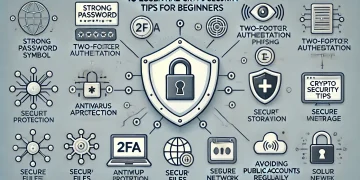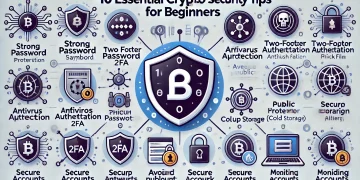The cryptocurrency industry stands at a crucial crossroads in 2024, facing an increasingly complex web of regulatory challenges that will shape its future trajectory. As digital assets continue to integrate into mainstream finance, regulatory bodies worldwide are intensifying their scrutiny and developing comprehensive frameworks to govern this rapidly evolving sector. This transformation brings both opportunities and obstacles for industry participants, from established cryptocurrency exchanges to emerging DeFi protocols.
The Evolving Regulatory Landscape
The cryptocurrency market has matured significantly since its early days, prompting regulators to take a more active role in oversight. In 2024, we’re witnessing a paradigm shift as governments worldwide move from reactive measures to proactive regulatory frameworks. This evolution reflects the growing recognition of cryptocurrencies as a legitimate asset class while acknowledging the need to protect investors and maintain financial stability.
Traditional financial regulators are expanding their jurisdiction to encompass crypto-assets, leading to more sophisticated and nuanced approaches to oversight. This shift represents a departure from the previous binary stance of either complete prohibition or minimal intervention, moving toward a more balanced regulatory environment that aims to foster innovation while mitigating risks.
Global Regulatory Divergence and Harmonization Efforts
One of the most significant challenges facing the cryptocurrency industry in 2024 is the lack of regulatory consistency across different jurisdictions. While some countries are embracing digital assets with open arms, others maintain restrictive policies, creating a complex operating environment for global cryptocurrency businesses. This regulatory fragmentation poses significant challenges for companies operating across borders and complicates compliance efforts.
International organizations are working to bridge these regulatory gaps, with bodies like the Financial Action Task Force (FATF) leading efforts to establish global standards for cryptocurrency regulation. However, achieving consensus among nations with different economic interests and regulatory philosophies remains a substantial challenge. The industry must navigate these varying requirements while maintaining operational efficiency and compliance.
Securities Regulation and Token Classification
A persistent regulatory challenge in 2024 centers around the classification of cryptocurrencies and digital tokens. The ongoing debate over whether certain cryptocurrencies should be classified as securities continues to create uncertainty for projects and exchanges. Regulatory bodies are developing more sophisticated frameworks for token classification, but the criteria remain complex and sometimes contradictory across jurisdictions.
The impact of securities regulations on the cryptocurrency market cannot be understated. Projects must carefully consider their token economics and distribution methods to avoid running afoul of securities laws. This regulatory uncertainty has led many projects to adopt more conservative approaches to token launches and trading operations, potentially limiting innovation in the space.
Anti-Money Laundering (AML) and Know Your Customer (KYC) Requirements
As cryptocurrencies gain mainstream adoption, regulators are placing increased emphasis on AML and KYC compliance. The implementation of robust verification procedures has become non-negotiable for cryptocurrency businesses operating in regulated markets. These requirements aim to prevent illicit activities while bringing cryptocurrency operations in line with traditional financial services standards.
The challenge lies in balancing these compliance requirements with the cryptocurrency industry’s founding principles of privacy and financial freedom. Exchanges and other service providers must invest significantly in compliance infrastructure while maintaining user experience and operational efficiency. This balance becomes particularly challenging for decentralized platforms that traditionally operate with minimal user identification.
DeFi Regulation and Compliance Challenges
Decentralized Finance (DeFi) presents unique regulatory challenges in 2024. The autonomous and decentralized nature of DeFi protocols conflicts with traditional regulatory frameworks that rely on identifiable intermediaries. Regulators are grappling with how to effectively oversee these platforms while preserving their innovative potential.
Some jurisdictions are developing specific regulations for DeFi platforms, while others are attempting to apply existing financial regulations to this new paradigm. The challenge lies in creating frameworks that can effectively regulate DeFi without stifling its fundamental innovations. Projects in this space must navigate an uncertain regulatory landscape while maintaining their decentralized characteristics.
Environmental Concerns and Mining Regulations
The environmental impact of cryptocurrency mining has attracted increased regulatory attention in 2024. Various jurisdictions are implementing or considering regulations regarding the energy consumption and carbon footprint of mining operations. These measures range from outright bans in some regions to requirements for using renewable energy sources in others.
Mining operations must adapt to these evolving regulations while maintaining profitability. This challenge has accelerated the industry’s shift toward more sustainable mining practices and the adoption of renewable energy sources. The regulatory pressure on environmental concerns is reshaping the mining landscape and influencing the geographic distribution of mining operations.
Consumer Protection and Market Integrity
Protecting retail investors remains a top priority for regulators in 2024. The volatile nature of cryptocurrency markets, combined with the complexity of many crypto products, has led to increased focus on consumer protection measures. Regulators are implementing stricter requirements for risk disclosure, marketing practices, and platform security.
Cryptocurrency businesses must develop robust consumer protection frameworks while maintaining their competitive edge. This includes implementing clear risk disclosure procedures, maintaining adequate security measures, and ensuring fair trading practices. The challenge lies in meeting these requirements without creating excessive barriers to entry for new users.
Cross-Border Transactions and Payment Systems
The use of cryptocurrencies for international payments has grown significantly, prompting regulators to focus on cross-border transaction oversight. In 2024, we’re seeing increased attention to how cryptocurrencies interact with traditional payment systems and international money transfer regulations. This includes considerations around CBDCs (Central Bank Digital Currencies) and their potential impact on cross-border payments.
The industry must navigate complex international payment regulations while maintaining the efficiency and cost advantages that make cryptocurrencies attractive for cross-border transactions. This involves working with multiple regulatory frameworks and ensuring compliance with various national payment systems regulations.
Future Outlook and Industry Adaptation
As we progress through 2024, the cryptocurrency industry continues to adapt to evolving regulatory requirements. The sector is showing increasing maturity in its approach to compliance, with many companies proactively engaging with regulators and developing robust compliance frameworks. This evolution suggests a more stable and regulated future for the cryptocurrency market.
The challenge for the industry lies in maintaining its innovative spirit while operating within regulatory boundaries. Success will require a delicate balance between compliance and innovation, with companies needing to invest in both technological development and regulatory expertise.
Frequently Asked Questions
What are the most significant regulatory challenges facing cryptocurrency companies in 2024? The most significant challenges include navigating securities regulations, implementing comprehensive AML/KYC procedures, adapting to environmental regulations, and managing cross-border compliance requirements. Companies must also balance innovation with regulatory compliance while maintaining operational efficiency.
How are DeFi platforms adapting to increased regulatory scrutiny? DeFi platforms are implementing various strategies, including enhanced governance mechanisms, regulatory compliance tools, and more transparent operating procedures. Some are also exploring hybrid models that maintain decentralization while incorporating necessary compliance measures.
What impact do varying international regulations have on cryptocurrency businesses? International regulatory differences create operational complexities, requiring businesses to maintain multiple compliance frameworks and potentially limit services in certain jurisdictions. This can increase operational costs and complicate expansion strategies.
How are environmental regulations affecting cryptocurrency mining? Environmental regulations are pushing mining operations toward renewable energy sources and more efficient mining practices. This has led to geographical shifts in mining operations and increased investment in sustainable mining technologies.
What role do consumer protection regulations play in the cryptocurrency market? Consumer protection regulations are becoming increasingly important, requiring platforms to implement robust risk disclosure procedures, security measures, and fair trading practices. This helps build market confidence but can increase operational complexity.
Reference disclaimer: As my knowledge cutoff date is April 2024, regulations and market conditions may have evolved since then. Readers should verify current regulatory requirements in their jurisdictions.






























